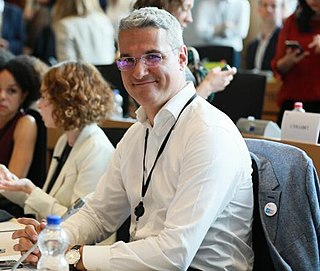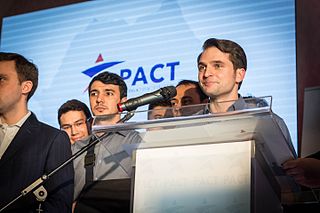
A business model describes how an organization creates, delivers, and captures value, in economic, social, cultural or other contexts. The process of business model construction and modification is also called business model innovation and forms a part of business strategy.
Program management is the process of managing several related projects, often with the intention of improving an organization's performance. It is distinct from project management.
Knowledge workers are workers whose main capital is knowledge. Examples include ICT Professionals, physicians, pharmacists, architects, engineers, scientists, design thinkers, public accountants, lawyers, editors, and academics, whose job is to "think for a living".

Futures studies, futures research, futurism, or futurology is the systematic, interdisciplinary and holistic study of social/technological advancement, and other environmental trends; often for the purpose of exploring how people will live and work in the future. Predictive techniques, such as forecasting, can be applied, but contemporary futures studies scholars emphasize the importance of systematically exploring alternatives. In general, it can be considered as a branch of the social sciences and an extension to the field of history. Futures studies seeks to understand what is likely to continue and what could plausibly change. Part of the discipline thus seeks a systematic and pattern-based understanding of past and present, and to explore the possibility of future events and trends.

In futurology, especially in Europe, the term foresight has become widely used to describe activities such as:
Technology forecasting attempts to predict the future characteristics of useful technological machines, procedures or techniques. Researchers create technology forecasts based on past experience and current technological developments. Like other forecasts, technology forecasting can be helpful for both public and private organizations to make smart decisions. By analyzing future opportunities and threats, the forecaster can improve decisions in order to achieve maximum benefits. Today, most countries are experiencing huge social and economic changes, which heavily rely on technology development. By analyzing these changes, government and economic institutions could make plans for future developments. However, not all of historical data can be used for technology forecasting, forecasters also need to adopt advanced technology and quantitative modeling from experts’ researches and conclusions.

Design management is a field of inquiry that uses design, strategy, project management and supply chain techniques to control a creative process, support a culture of creativity, and build a structure and organization for design. The objective of design management is to develop and maintain an efficient business environment in which an organization can achieve its strategic and mission goals through design. Design management is a comprehensive activity at all levels of business, from the discovery phase to the execution phase. "Simply put, design management is the business side of design. Design management encompasses the ongoing processes, business decisions, and strategies that enable innovation and create effectively-designed products, services, communications, environments, and brands that enhance our quality of life and provide organizational success." The discipline of design management overlaps with marketing management, operations management, and strategic management.
Innovation management is a combination of the management of innovation processes, and change management. It refers to product, business process, marketing and organizational innovation. Innovation management is the subject of ISO 56000 series standards being developed by ISO TC 279.
Corporate foresight has been conceptualised by strategic foresight practitioners and academics working and/or studying corporations as a set of practices, a set of capabilities and an ability of a firm. It enables firms to detect discontinuous change early, interpret its consequences for the firm, and inform future courses of action to ensure the long-term survival and success of the company.
Design for lean manufacturing is a process for applying lean concepts to the design phase of a system, such as a complex product or process. The term describes methods of design in lean manufacturing companies as part of the study of Japanese industry by the Massachusetts Institute of Technology. At the time of the study, the Japanese automakers were outperforming the American counterparts in speed, resources used in design, and design quality. Conventional mass-production design focuses primarily on product functions and manufacturing costs; however, design for lean manufacturing systematically widens the design equation to include all factors that will determine a product's success across its entire value stream and life-cycle. One goal is to reduce waste and maximize value, and other goals include improving the quality of the design and the reducing the time to achieve the final solution. The method has been used in architecture, healthcare, product development, processes design, information technology systems, and even to create lean business models. It relies on the definition and optimization of values coupled with the prevention of wastes before they enter the system. Design for lean manufacturing is system design.

Jeanne M. Liedtka, is an American strategist and professor of business administration at the Darden School of the University of Virginia, particularly known for her work on strategic thinking, design thinking and organic growth.
Systemic design is an interdiscipline that integrates systems thinking and design practices. It is a pluralistic field, with several dialects including systems-oriented design. Influences have included critical systems thinking and second-order cybernetics. In 2021, the Design Council (UK) began advocating for a systemic design approach and embedded it in a revision of their double diamond model.

The Business Model Canvas is a strategic management template used for developing new business models and documenting existing ones. It offers a visual chart with elements describing a firm's or product's value proposition, infrastructure, customers, and finances, assisting businesses to align their activities by illustrating potential trade-offs.
Andy Hines is an American futurist, head of graduate studies in Foresight at the University of Houston, and author of several books on strategic foresight. Hines is a professional futurist, co-creator of the framework foresight method, Assistant Professor and Program Coordinator of the Graduate Program in Foresight at the University of Houston, Principal of foresight consulting firm Hinesight, and former organizational futurist at Kellogg Company and Dow Chemical. He has written extensively on futures studies, strategic foresight, foresight research methods, the role of organizational futurists, and the consumer landscape.
Adrian Curaj is a Romanian electrical engineer who was named Education Minister in the new government of Dacian Cioloș in November 2015. He was removed during a cabinet reshuffle the following July.
The Integrated Management Concept, or IMC is an approach to structure management challenges by applying a "system-theoretical perspective that sees organisations as complex systems consisting of sub-systems, interrelations, and functions". The most characteristic aspect of the IMC is its distinction between three particular management dimensions: normative, strategic, and operational management, which are held together by different integration mechanisms. The normative management dimension determines the general aim of the organization, the strategic dimension directs the plans, basic structures, systems, and the problem-solving behaviour of the staff for achieving it, and the operative level translates the normative missions and strategic programs into day-to-day organizational processes.

Dragoș Pîslaru is a Romanian economist and politician of REPER who has been serving as a Member of the European Parliament since 2019. He was previously a member of USR PLUS/USR. He also held the position of Minister of Labor, Family, Social Protection and the Elderly in the government of Prime Minister Dacian Cioloș from 18 April 2016, until 4 January 2017.
Customer foresight is a new field of applied research. It aims to understand future consumer preferences and wishes with regard to tomorrow's products and services. It does so by combining customer research and foresight research elements. Customer foresight can be conceived as an interaction with projected future markets through selected customers by understanding their wishes and attitudes, ideas and visions as well as their perception of signals and drivers of change. Even though the concept cannot predict the future, it enables companies to prepare for different future scenarios and thus improves strategy and decision-making processes.
Knowledge-intensive services, abbreviated as KIS, are services that involve activities that are intended to result in the creation, accumulation, or dissemination of knowledge, where knowledge-intensiveness refers to how knowledge is produced and delivered with highly intellectual value-add. Knowledge intensive business services are the knowledge-intensive service activities for developing a customized service or product solution to satisfy the client's needs and they are provided mainly for other companies or organizations. These concepts are continuously discussed, formulated, and developed as a part of the constantly evolving academic discipline of knowledge management.

Sebastian Ioan Burduja is a Romanian politician. He is currently the Minister of Energy in the Government of Romania, after fulfilling the role of Minister of Research, Innovation, and Digitalization previously (2022-2023). He is also the vice-president of the National Liberal Party (PNL) and the president of the PNL branch Sector 1 – Bucharest. In December 2020, he was elected deputy of the National Party in the 42nd constituency of Bucharest. He was until August 2019 the president and founder of the Youth Civic Action Platform (PACT) party, launched in January 2016. He founded and led the League of Romanian Students Abroad (LSRS) and the CAESAR Foundation.







